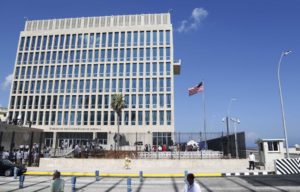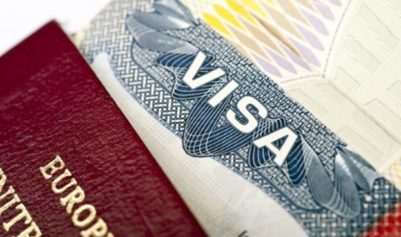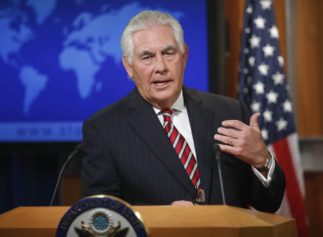
U.S. flag flies at the U.S. embassy in Havana, Cuba. (AP Photo/Desmond Boylan, File)
WASHINGTON (AP) — The United States on Friday abruptly warned Americans not to visit Cuba and ordered more than half its Havana embassy personnel to leave the island in a dramatic response to mysterious recent “specific attacks” harming the health of U.S. diplomats.
The actions deal a blow to already delicate ties between the U.S. and Cuba, longtime adversaries who only recently began putting their hostility behind them. The embassy in Havana will lose roughly 60 percent of its U.S. staff, and will stop processing visas in Cuba indefinitely, officials said. Roughly 50 Americans are currently working at the embassy in Havana.
“Until the government of Cuba can ensure the safety of our diplomats in Cuba, our embassy will be reduced to emergency personnel in order to minimize the number of diplomats at risk of exposure to harm,” Secretary of State Rex Tillerson said in a statement announcing the step.
He and President Donald Trump reviewed the options in a White House meeting this week, officials said.
In Friday’s travel warning, the State Department said some of the unexplained physical effects have occurred in Cuban hotels, and that while American tourists aren’t known to have been hurt they could be exposed if they travel to Cuba. Tourism is a critical component of Cuba’s economy that has grown in recent years as the U.S. has relaxed restrictions.
“Over the past several months, numerous U.S. Embassy Havana employees have been targeted in specific attacks,” the department said in the warning. “These employees have suffered significant injuries as a consequence of these attacks. Affected individuals have exhibited a range of physical symptoms including ear complaints and hearing loss, dizziness, headache, fatigue, cognitive issues and difficulty sleeping.”
“Because our personnel’s safety is at risk, and we are unable to identify the source of the attacks, we believe U.S. citizens may also be at risk and warn them not to travel to Cuba,” it said. “Attacks have occurred in U.S. diplomatic residences and hotels frequented by U.S. citizens.”
For now, the United States is not ordering any Cuban diplomats to leave Washington, a move the administration had considered, officials said. Several U.S. lawmakers have called on the administration to expel all Cuban diplomats. In May, Washington asked two to leave but emphasized it was to protest Havana’s failure to protect diplomats on its soil, not an accusation of blame.
Almost a year after diplomats began describing unexplained health problems, U.S investigators still don’t know what or who is behind the attacks, which have harmed at least 21 diplomats and their families.
Until now, the State Department has called them “incidents” and generally avoided deeming them attacks. Tillerson made the decision to draw down the embassy after considering other options that included a full embassy shutdown and less significant personnel reductions.
To medical investigators’ dismay, the symptoms in the attacks vary widely from person to person. In addition to hearing loss and concussions, some experienced nausea, headaches and ear-ringing, and The Associated Press has reported some now suffer from problems with concentration and common word recall.
Though officials initially suspected some futuristic “sonic attack,” the picture has grown muddier. The FBI and other agencies that searched homes and hotels where incidents occurred found no devices. And clues about the circumstances of the incidents seem to make any explanation scientifically implausible.
Some U.S. diplomats reported hearing loud noises or feeling vibrations when the incidents occurred, but others heard and felt nothing yet reported symptoms later. In some cases, the effects were narrowly confined, with victims able to walk “in” and “out” of blaring noises audible in only certain rooms or parts of rooms, the AP has reported
The United States notified Cuba early Friday via its embassy in Washington. Cuba’s embassy had no immediate comment.
Cubans seeking visas to enter the U.S. may be able to apply through embassies in nearby countries, officials said. The U.S. will also stop sending official delegations to Cuba, though diplomatic discussions will continue in Washington.
The moves deliver a significant setback to the delicate reconciliation between the U.S. and Cuba, two countries that endured a half-century estrangement despite their locations only 90 miles apart. In 2015, President Barack Obama and Cuban President Raul Castro restored diplomatic ties, embassies re-opened, and travel and commerce restrictions were eased. Trump has reversed some changes, but has broadly left the rapprochement in place.
The Trump administration has pointedly not blamed Cuba for perpetrating the attacks. Officials have weighed the best way to minimize potential risk for Americans in Havana without unnecessarily harming relations between the countries.
Though the incidents stopped for a time, they recurred as recently as late August. The U.S. has said the tally of Americans affected could grow.
Already, staffing at the embassy in Havana was lower than usual due to the recent hurricanes that whipped through Cuba.
Though Cuba implored the United States not to react hastily to the reports of health attacks, it appeared that last-minute lobbying was unsuccessful in the highest-level diplomatic contacts between the countries since the start of Trump’s presidency in January.
Last week, the Cuban official who has been the public face of the diplomatic opening with the U.S., Josefina Vidal, came to the State Department for a meeting in which the U.S. pressed its concerns. Foreign Minister Bruno Rodriguez used his speech to the U.N. General Assembly to insist Cuba had no idea what was harming American diplomats, while discouraging Trump from letting the matter become “politicized.”
As concerns grew about a possible embassy shutdown, Cuba requested an urgent meeting Tuesday between Rodriguez and Tillerson in which the Cuban again insisted his government had nothing to do with the incidents. Rodriguez added that his government also would never let another country hostile to the U.S. use Cuban territory to attack Americans.
Citing its own investigation, Cuba’s embassy said after the meeting: “There is no evidence so far of the cause or the origin of the health disorders reported by the U.S. diplomats.”

